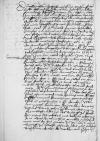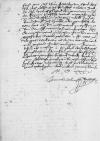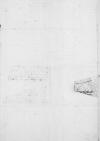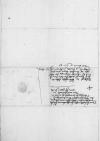 GStA, PK, HBA, C 2, No 99, f. 1r
GStA, PK, HBA, C 2, No 99, f. 1r
Durchlauchter(r), hochgeborner(r) furst, grosgunstiger(r), lieber her(r) und freundt. / Mein gancz willige, freuntliche dienste zuvoran. /
So sichs adscribed⌈ss adscribed⌉ dan noch dem willen des almochtigen(n) zugetragen, das mein ⌊svog written over s⌈sgg written over s⌉er(r)⌋ in Got vorstorben(n), / den weg des flechess, / do hin wir alle mussen, / gegangen(n), / ist mein hochfleissig und freuntdinstlich bitt, / Ew(e)r F(urstliche) D(urchlauch)t wolde meiner betrubten ⌊svester(r)⌋ ein genediger(r) her(r) sein / und ir lossen folgen und vorhelffen, darzu sie noch ires eheghaten tode fueg und recht hoth. Bedancke mich ouch hochlichen gen E(wer) D(urchlauch)t der gnedigen zunegunge, / die E(wer) D(urchlauch)t zu meynem seligen ⌊svoger⌋ im leben und noch seynem(m) tode gehabt, / nemlich der gnoden, die E(wer) D(urchlauch)t disse zceit her(r) und iczund meiner svester on the margin⌈meiner ⌊svester⌋meiner svester on the margin⌉ in irer trubseligheit ir bewisen, / do neben ouch der durchlaucht(e)n, hochgeborn ⌊furstin⌋, E(wer) D(urchlauch)t gemhal, / der ich gern heth geschriben, so ich nicht wuste, das ich hie written over h...⌈h... illegible⌈...... illegible⌉hiehie written over h...⌉ mit II selen und einem(m) leibe thet schreiben. / Thue dennoch ⌊ire d(urchlauch)t⌋ gancz fleissig bitten, wolde meiner besmerczt(e)n ⌊svester(r)⌋ bey E(wer) D(urchlauch)t / und ir selbst ein gnedige fraw sein, / biss so lange ich noch ir werd thun schicken, / welchs ich umb beide Ewre D(urchlauch)t(en) fruntlich und fleissig wil beschulden und vordinen etc.
Vor das frunttlich ⌊⌋ und newe czeitung, mir dur written over ...⌈... illegible⌈...... illegible⌉rr written over ...⌉ch dissen written over ...⌈... illegible⌈...... illegible⌉sensen written over ...⌉(n) meinen(n) kamerjungen geantwurth, thue ich ouch hochlich E(wer) D(urchlauch)t dancken. / Mir sein negst brive von der ⌊Wilden⌋, den XIIII tag dis monts geben, zu komen(n), / das mein freuntlicher, liber her(r), der bischoff zu Krako, den XXIX tag Octobris mit tode sey abgang(en), dem Goth der almechtige gnedig sey / und wie mir der her(r) etwan zu Premisl, iczund bischoff zu Ploczke schreibt, / das noch solchen(n) bichsthum / der von der Wilden und Posenn(n)  GStA, PK, HBA, C 2, No 99, f. 1v fast sere sich thun bearbeiten / und das her sich selbst ouch ⌊ko(nigliche)r m(aieste)t⌋ erboten hab, / so her irer m(aieste)t und den gemeinen nucz der ⌊Kronen⌋ tuchtig wurd angeschen, / sich in dem bichstumt ouch gern(n) wold lossen brauchen etc. Ich halts aber genczlich da vor, / das es im nicht werd entschen etc. Von ⌊Danczk⌋ wirt vil wunders von den(n) denneschen und lubschen hendlen an mich geschriben(n). / Wold gern(n) von E(wer) D(urchlauch)t was gewisses, / und wie es dissen winter wil ein gestalt haben(n), wissen. / Hiemit thue ich mich in E(wer) D(urchlauch)t und derselbtigen(n) furstlichen ⌊gemhal⌋ gunst befhelenn(n), Got unsern h(e)rn bittend, wolde beydenn(n) sein gotliche gnad, / gutte gesuntheit un(n)d glukselige regirung / biss an ⌊Matusalem⌋ zceit vorleyen. /
GStA, PK, HBA, C 2, No 99, f. 1v fast sere sich thun bearbeiten / und das her sich selbst ouch ⌊ko(nigliche)r m(aieste)t⌋ erboten hab, / so her irer m(aieste)t und den gemeinen nucz der ⌊Kronen⌋ tuchtig wurd angeschen, / sich in dem bichstumt ouch gern(n) wold lossen brauchen etc. Ich halts aber genczlich da vor, / das es im nicht werd entschen etc. Von ⌊Danczk⌋ wirt vil wunders von den(n) denneschen und lubschen hendlen an mich geschriben(n). / Wold gern(n) von E(wer) D(urchlauch)t was gewisses, / und wie es dissen winter wil ein gestalt haben(n), wissen. / Hiemit thue ich mich in E(wer) D(urchlauch)t und derselbtigen(n) furstlichen ⌊gemhal⌋ gunst befhelenn(n), Got unsern h(e)rn bittend, wolde beydenn(n) sein gotliche gnad, / gutte gesuntheit un(n)d glukselige regirung / biss an ⌊Matusalem⌋ zceit vorleyen. /
 GStA, PK, HBA, C 2, No 99, f. 2v
GStA, PK, HBA, C 2, No 99, f. 2v  GStA, PK, HBA, C 2, No 99, f. 1r
GStA, PK, HBA, C 2, No 99, f. 1r  GStA, PK, HBA, C 2, No 99, f. 1v fast sere sich thun bearbeiten / und das her sich selbst ouch
GStA, PK, HBA, C 2, No 99, f. 1v fast sere sich thun bearbeiten / und das her sich selbst ouch 


